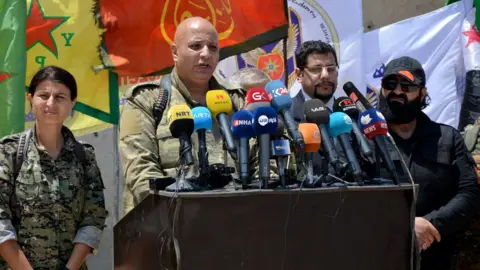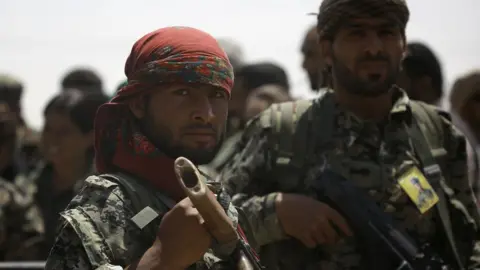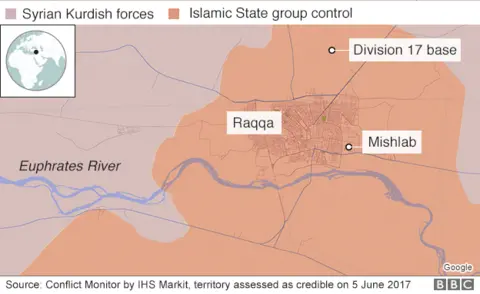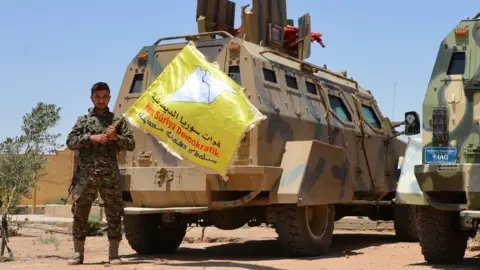US-backed forces face fierce battle for Raqqa
 EPA
EPAOn Tuesday, the Kurdish-Arab Syrian Democratic Forces (SDF) alliance announced that the battle for Raqqa had officially begun.
It is the final phase of a campaign - codenamed Operation Wrath of Euphrates - that was launched in November, shortly after Iraqi forces moved to recapture the city of Mosul.
The initial goal of this campaign was to isolate the so-called Islamic State's de-facto capital and thereafter recapture it
But as the SDF's fighters advanced, they faced considerable resistance from IS militants.
When they tried to capture the Tabqa Dam with the help of US special forces earlier this year, IS opened several turbines to raise the water level of the River Euphrates.
If the dam had been breached before the SDF seized control in May, there could have been flooding on a massive scale across Raqqa province and as far away as Deir al-Zour.
 AFP
AFPThe SDF attacked Raqqa from the north, west and east on Monday after a series of heavy air strikes conducted by the US-led coalition against IS.
The south of the city is meanwhile sealed off by the Euphrates, which can only be crossed by boat because the bridges over it were knocked out in pre-emptive strikes.
It is expected that the battle for Raqqa will be very fierce.
The coalition recently estimated that that there are 3,000 to 4,000 IS fighters holed up inside, including foreign fighters and various senior figures.
It is unclear how many civilians are trapped in the city, but the International Rescue Committee put the figure at 200,000 and warned that they were at risk of being killed by IS if they attempted to flee or used as human shields if they remained.

Similar to previous battles, IS will probably resort to using suicide bombers ("istishhadiyun") and suicide fighters ("inghimasiyun").
While the former normally operate alone and detonate car bombs, the latter operate in groups and fight first enemy forces with weapons and grenades before detonating suicide vests in order to inflict the highest amount of damage.
It is also expected that IS militants will make extensive use of weaponised drones, as they have done in the battle for Mosul.
IS operates swarms of up to five off-the-shelf quadcopters armed with hand grenades or artillery shells, which are dropped onto targets.
Drone attacks have caused military and civilian casualties. IS has claimed that in one week they killed or wounded 39 soldiers.
The objective of the anti-IS coalition is the elimination of IS fighters.
US Defence Secretary James Mattis stated very clearly in late May that the US had switched from attrition to "annihilation tactics" against IS in Iraq and Syria, so that "foreign fighters do not survive the fight to return home to North Africa, to Europe, to America, to Asia, to Africa".
It is, however, expected that civilians will also be at high risk.
Mr Mattis recognized this, but added that despite US forces doing everything "humanly possible" to prevent civilian casualties, they were "a fact of life in this sort of situation".
The wider Raqqa campaign has already led to massive civilian casualties and displacement over the past six months.

The fall of Raqqa will be a major victory for the anti-IS coalition and especially the SDF, which has spearheaded the campaign to capture the city.
Beyond being the de-facto capital of the "caliphate" proclaimed by IS in 2014, Raqqa has also served as an operation base to plan attacks in the West.
The Belgian jihadist Oussama Ahmad Atar is believed to have trained and directed the militants behind the deadly attacks on Paris and Brussels in November 2015 and March 2016 from there.
Mohammed Emwazi, the infamous British militant who became known as "Jihadi John" after beheading IS hostages in a series of videos, was also operating from Raqqa and was killed in an air strike on the city in November 2015.
 EPA
EPARaqqa's liberation by the SDF will be a cause for concern in Turkey, however, because it will reinforce the possibility of the Kurds establishing a semi-autonomous region across parts of northern Syria and along the Turkish border.
Turkey's Prime Minister Binali Yildirim has warned that it "will immediately give the necessary response if we come across a situation in Raqqa or any other point in the region that threatens our security".
Ankara considers the Kurdish militia that dominates the SDF, the Popular Protection Units (YPG), to be part of its arch-enemy, the Kurdistan Workers' Party (PKK). Thus it is opposed to any actions that strengthen the YPG's position in Syria.
The fall of Raqqa will bring an end to the physical IS caliphate.
However, one has to keep in mind that fighting the group's ideology will be a longer-term battle requiring more than solely military victories.
Dr Jean-Marc Rickli is head of global risk at the Geneva Centre for Security Policy and visiting fellow at the Department of Defence Studies at King's College London. @Dr_JMRickli
